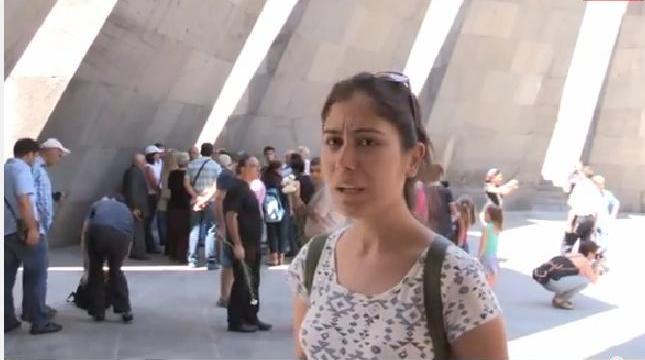“Ari Tun”-2014: “Return to identity”: “Wherever I go in Armenia, I look for Mount Ararat…”-Jelal Erdemji

“I’m still confused. Who am I?” This is what Jelal Erdemji asks himself and is trying to find the answer. Jelal Erdemji lives in Diyarbekir and is of Armenian origin.
I am Jelal Erdemji. I am 21 years old and live in Diyarbekir. I’m studying law at Tigris University of Diyarbekir and will be graduating in two years.
I was one of the lucky children in Diyarbekir whose parents had told us that we were Armenian at an early age. Although my parents would keep their origin and identity a secret from their peers, I would tell my friends that I’m Armenian.
What do I know about my ancestors? My mother’s and father’s families are from the Kulp village of Tigranakert. My grandparents were forced to convert to Islam in 1915, and my parents were also brought up as Muslims.
I know very little about my family and their life before 1915. The only thing I know is that my grandfather was educated at a church. He was most probably a clergyman. I also know that my mother’s father was a very patriotic man. He was a freedom fighter and traveled to Russia a lot. Those were probably trips devoted to preservation of the Armenian identity and fighting in the military. But my grandmother always hid her identity from my mother and us and didn’t share any stories about her family.
Who am I? I’m still confused. I am both Kurdish and Armenian. I believe in Islam and Christianity. That’s how I feel. I can’t say what will happen in the future. I was raised as a Muslim, and I can’t change all that overnight. I can’t wake up one day and decide to become a Christian.
Similarities: When I came to Armenia, I became convinced that the people in Armenia do a lot of things that we do in Diyarbekir and knew as Kurdish traditions. At the Museum of Ethnography, I saw the Tarehats (bread) made during the Kaghand (Christmas) in which people place a coin. I also saw the Ghavurma and other Armenian meals that we also prepare in Diyarbekir, and these aren’t the only similarities.
Why did I want to visit Armenia? This is my first visit to Armenia. I’ve always been interested in Armenia. I wanted to visit and see it for myself. I knew that many Armenians used to live in Western Armenia prior to 1915 and that there are only Armenians in Eastern Armenia now. I really wanted to visit and see all that with my own two eyes. This trip came as a big surprise to me. Now, I’m happy to be in Armenia and to be participating in the “Ari Tun” Program along with my peers from Diyarbekir.
My impressions: We arrived in Armenia at night, and I couldn’t see much. When we started touring Yerevan and visiting different sites the following day, I realized that the people on both sides of the border are very similar and that the border seems to be “phony”.
I understood one important thing in Armenia. Even though I don’t speak Armenian and I am not Christian, I didn’t feel like a foreigner. There was no difference in the culture. Everything was familiar to me. This made me happy and moved me at the same time.
I loved Mount Ararat the most. Turk writer Eje Temelkura has a book entitled “The Depth of Ararat”. Inspired by Hrant Dink, he came to Armenia and wrote that book here. After reading the book, I understood why the people in Armenia attach so much importance to Ararat and what it means to the people living on this side of Ararat. I also read the poems by Silva Kaputikyan in that book. I can’t even recite a word of those poems. I only remember that those poems were about the homeland and Ararat.
I didn’t understand what the reason was and why that mountain was so important for the people living on this side of the border. I understood all that when I came to Armenia. I understood that Ararat is one of the most important things in Armenia. Now, wherever I go in Armenia, I look for Mount Ararat.
How will my life change when I return? I don’t know yet, but I’m certain that a lot of things will change. I have mixed emotions. Armenia, my impressions and experiences are like a dream, and it will take a long time for me to understand, analyze, relive and appreciate them…
LUSINE ABRAHAMYAN




 Արևելահայերեն
Արևելահայերեն Արևմտահայերեն
Արևմտահայերեն Русский
Русский






